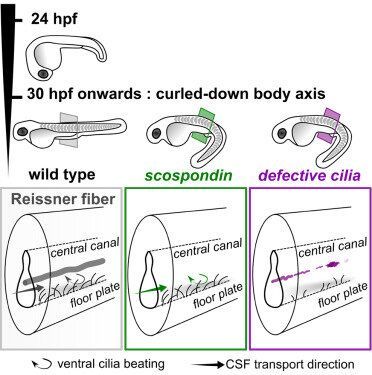Lurking just beneath the surface of just about every common nursery rhyme is a complex record of times long gone. For example, the “crooked man” who “laid a crooked sixpence upon a crooked style” was none other than the great 17th-century Scot General Sir Alexander Leslie. The crooked stile was the uneasy border between Scotland and England established by the controversial covenant he signed. Quite similarly, many enigmatic structures that permanently persist or otherwise transiently appear and resorb in the development of the nervous systems of many creatures also encode a rich evolutionary past.
One such functioning relic is Reissner’s fiber, a glycoprotein sheet secreted by the subcommissural organ (SCO) that inexorably treadmills down the central canal of the spinal cord. Although the SCO was one of the first structures of the mammalian brain to differentiate, in humans, it begins regressing around age three or four and typically becomes vestigial by adulthood. The main component of Reissner’s fiber is a giant 5000-amino-acid vertebrate molecule called SCO-spondin. This protein contains axonal pathfinding domains critical to development of the posterior commissure, a transhemispheric highway that bears axons controlling the pupillary light reflex.
The other product of the SCO is a thyroid-hormone-transporting protein called transthyretin. Much like all the organified metals fixed by life, iodine has a unique story to tell in the evolution of the body plan. Recently, an intriguing connection between Reissner’s fiber and development of the spine that houses it has been discovered in the model organism, zebrafish. These fish, as recently observed for the serotonergic control of neurogenesis, have proven to be an exemplary model for studying all things neural. In the latest issue of Current Biology, author Nathalie Jurisch-Yaksi reviews a remarkable confluence of ideas that establish an indisputable role for Reissner’s membrane building a straight and strong spine.









Comments are closed.